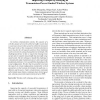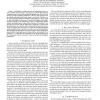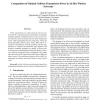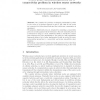ICDCS
2010
IEEE
14 years 4 months ago
2010
IEEE
—Transmission power plays a crucial role in the design and performance of wireless networks. The issue is therefore complex since an increase in transmission power implies that a...
GI
2001
Springer
14 years 5 months ago
2001
Springer
In wireless communication systems, the capacity of a cell (the amount of correctly delivered traffic in unit time) is a precious resource that can not be arbitrarily increased. T...
ICPPW
2002
IEEE
14 years 5 months ago
2002
IEEE
Abstract—In this paper, we address the issue of transmission power control in wireless ad-hoc networks. In general, it is assumed that minimum transmission power achieves the opt...
SENSYS
2003
ACM
14 years 5 months ago
2003
ACM
Experience has shown that the power consumption of sensors and other wireless computational devices is often dominated by their communication patterns. We present a practical real...
ICDCSW
2003
IEEE
14 years 5 months ago
2003
IEEE
Power conservation is a critical issue for ad hoc wireless networks. The main objective of the paper is to find the minimum uniform transmission power of an ad hoc wireless netwo...
BERTINORO
2005
Springer
14 years 6 months ago
2005
Springer
We consider the problem of assigning transmission powers to the nodes of a wireless network in such a way that all the nodes are connected by bidirectional links and the total powe...
SENSYS
2006
ACM
14 years 6 months ago
2006
ACM
Extensive empirical studies presented in this paper confirm that the quality of radio communication between low power sensor devices varies significantly with time and environme...
IWCMC
2006
ACM
14 years 6 months ago
2006
ACM
Adaptively adjusting transmission rate and power to concurrently enhance goodput and save energy is an important issue in the wireless local area network (WLAN). However, goodput ...
SAMOS
2007
Springer
14 years 6 months ago
2007
Springer
For most applications in wireless sensor networks (WSNs), it is often assumed that the deployment of sensor nodes is unmanaged and random, so the density of local node may vary thr...
PAM
2007
Springer
14 years 6 months ago
2007
Springer
Abstract. The use of power control in wireless networks can lead to two conflicting effects. An increase in the transmission power on a link may (i) improve the quality and thus t...




